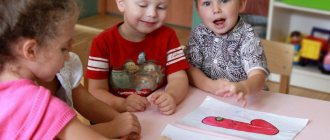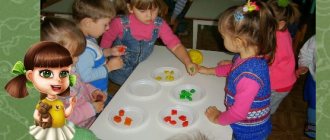Speech formation: stages and recommendations
As the child grows and develops, he first pronounces individual sounds, then simple words (for example, “mom” or “dad”), and only then learns to speak more complex words. Speech development is a fascinating process that parents watch with great interest.
Speech development plays an important role in the overall development of the child. Knowing the specifics of this process and its main stages, you can understand how developed your child’s speech skills are. Let's take a closer look at them.
Speech development in a child
The foundations of speech are laid in a child during the first year of life, and the first three years of life are decisive in the development of speech skills. These skills develop in an atmosphere in which the child hears the sounds and speech of other people. Children under three years of age perceive language best, so developing speech skills at this age is extremely important.
Babies communicate by crying, for example when they are hungry or want their parents to come to them. As they develop, they learn to hear and understand the sounds of language and can express themselves using single words and short one-syllable sentences. The rate of development of speech skills is individual for each child.
Stages of development of language skills in children
Pre-speech stage
At this stage, the child learns to communicate with others. Most children begin to communicate with their parents at about one year of age. By this time, children understand most of what their parents tell them and can express their needs by pointing to specific objects.
It should also be noted that not all children develop language skills in the same sequence.
3–4 years
At the age of 3–4 years, a child usually has long and interesting, although sometimes meaningless, conversations with his parents. At this age, children's vocabulary increases and they begin to understand the basics of the grammatical structure of the language. They talk a lot and enjoy long conversations.
At this stage, there are certain indicators that indicate the child’s normal speech development:
1. The child quickly learns new words.
2. The child uses plural nouns, but may use verb forms incorrectly (for example, he may say “sells” instead of “sells”).
3. A three-year-old child speaks almost clearly and coherently:
- makes sentences of four or more words;
- knows and understands children's poems;
- uses pronouns correctly.
4. The speech of a four-year-old child is completely understandable, but sometimes there are minor inaccuracies. At this age the child:
- uses long and complex sentences;
- can tell long stories with the correct sequence of events;
- asks a lot of questions. The child’s speech is clear and understandable, without gross errors.
During preschool age, children typically have longer, more complex conversations with their parents.
5–8 years
By age 5, a child typically speaks grammatically correctly and demonstrates a large vocabulary. By age six, children can write simple stories and understand how sounds form words.
The indicators of a child’s speech development at this stage are as follows:
1. At the age of five, a child usually forms sentences grammatically correctly, but sometimes makes grammatical errors.
2. Five year old child:
- has a more extensive vocabulary;
- can express his point of view in discussions.
3. By the age of six, a child understands about 13,000 words.
4. A six-year-old child uses pronouns correctly and understands the difference between them.
5. By the age of seven, a child understands 20,000 to 26,000 words and can recognize errors in other people's speech.
6. At the age of eight, children make very few grammatical errors. They can have meaningful conversations with adults and follow complex instructions without repetition. They can read age-appropriate texts and write simple essays.
These are the main stages of children's speech development. However, some children reach certain milestones earlier and others later than usual. As long as you see progress in the child’s speech development, albeit small, there is no reason to worry. However, sometimes a child may not understand what is being said to him and may also have difficulty expressing his thoughts. This may indicate a language disorder in the child. Although such disorders can be a serious problem, they are treatable.
Speech disorders in children
To develop language skills, a child must have listening, understanding and remembering skills. Also, the child must be able to structure his speech. If these skills are not developed, it may be associated with speech disorders.
According to statistics, symptoms of various speech disorders are observed in 5% of all children. Speech disorders in children are different from speech defects, which involve the child's inability to articulate certain speech sounds. With speech disorders, children reproduce sounds normally and their speech is understandable. However, they face difficulties understanding the speech of others (receptive language) or expressing their own thoughts (expressive language).
How to determine if a child has problems with speech development?
Children suffering from receptive language disorder (also medically known as sensory alalia) may have difficulty with:
- understanding the speech of others;
- following instructions;
- organizing your thoughts.
Children with expressive language disorder (also known as motor alalia) have difficulty expressing their thoughts and needs:
- their sentences may be short and simple, and their speech unstructured;
- their vocabulary may be significantly smaller than that of their peers;
- It can be difficult for them to find the right word, they are able to fill pauses with various sounds or filler words (“umm”, “nuuu”, etc.);
- they may use grammatical forms of words incorrectly;
- they can repeat the same phrases in the same story.
One of the most serious language disorders is specific speech disorder:
- children have delayed speech development (for example, they may not be able to speak until they are three years old);
- at the age of three they may not speak clearly enough;
- Children are susceptible to difficulties using verbs in speech. This is the hallmark of a specific speech disorder;
- children may miss auxiliary verbs in sentences;
- Children confuse verb tenses.
Causes of speech disorders
Sometimes a child cannot develop speech production, listening, understanding and remembering skills for various reasons:
- The child does not hear enough live speech in everyday life. The more a child is immersed in a language environment, the faster he develops speech skills;
- some children experience difficulties only in the development of speech, while other areas of the psyche develop normally;
- The causes of expressive speech disorder are not fully understood. But sometimes such a disorder is associated with developmental delays;
- receptive language disorder can be caused by genetic disorders;
- mixed speech disorders can be caused by traumatic brain injuries;
- speech disorders can occur in children with developmental delays, autism spectrum disorders and hearing problems;
- A speech disorder such as aphasia (impairment of already formed speech) can occur due to damage to the central nervous system.
If your child has difficulty developing speech even at age three or older, consult a doctor to identify and promptly treat possible health problems.
Diagnosis and treatment of speech disorders
- the doctor should examine the family's medical history to find out whether family members have had speech disorders;
- the doctor can conduct tests for the child on the level of development of receptive and expressive speech;
- A hearing test or audiometry can help determine whether your child has hearing problems.
Speech therapy is the best way to treat speech disorders. Consultations with a psychologist or psychotherapist are also recommended, because speech disorders can lead to psychological problems.
How to develop speech in a child: useful tips
1. Talk to your child . Talk to him about general topics as much as possible. For example, you can start a conversation with abstract phrases: “We are going for a walk in the park. Do you see how the birds fly? Do you feel how the flowers smell?”
2. Read books to your child. It's never too early to start reading books to your child. Start with books for little ones, then as your child gets a little older, move on to fairy tales and short children's stories.
3. Turn on your child’s TV and computer as little as possible. Do not introduce your child to electronic devices from early childhood. To develop speech skills, a child needs to interact with people and hear live speech. TV cannot provide him with this.
4. Go for walks with your child. A walk to the park or museum together can open up a whole new world for him. The more a child interacts with the world around him, the more curious he becomes and the more questions he asks. You can talk to your child, encouraging him to share new experiences.
5. Set a good example . When talking to your child, stand opposite him. Speak slowly and clearly. If a child says a word incorrectly, do not scold him, but correct him by saying the word correctly. Knowing how to pronounce a word correctly, the child will learn.
6. Remember that you and your child have different levels of speech development. Don't use words or phrases that your child won't understand. If you nevertheless utter some word that is incomprehensible to the child, explain its meaning.
7. Adapt to the child. If he initiates the conversation, let him talk and explain. Support your child in such situations: even a simple pat on the shoulder will give him self-confidence.
8. Speak and repeat . If your child pronounces a word correctly, repeat it several times in different sentences to help him understand its meaning better.
9. Learn new words with picture books. Buy some picture books and help them learn new simple words (eg ball, tree, etc.). After that, show the picture that matches this word. Discuss the picture with your child.
10. Teach your child new words. Teach your child new words from time to time. Invite your child to come up with a sentence with a new word. It doesn’t matter if the child doesn’t immediately understand a new word. Sooner or later he will learn to use it correctly.
11. Ask your child questions. Do everything you can to help your child develop language skills. If you are walking in the park, find something that interests your child. Ask him questions and invite him to tell you what he sees.
12. Sing songs to your child and read poetry. The rhymes that are in poems and songs help the child better learn new words.
Bilingual atmosphere and child speech development
Sometimes it happens that a child grows up in an environment where two or more languages are spoken. And parents worry: will this situation lead to speech disorders in the child?
Experts answer this question unequivocally: no. Until recently, parents were encouraged to speak one language in front of their child. Psychologists believed that a bilingual environment could interfere with a child's ability to acquire language. It was also believed that a child learns to speak faster and easier in the language that is heard more often in the child’s environment. However, such assumptions have not found scientific confirmation. Moreover, there are many examples of young children growing up in a bilingual environment and successfully acquiring both languages.
If your child suffers from some type of developmental delay, don't despair. Spend more time developing his speech skills. If your efforts are not enough, seek professional help to cope with speech disorders.
Related links:
- The main stages of speech development in children
- Simple ways to teach a child to speak
- Speech development in a child: how to speed it up
- How to help a child start talking?
- Speech delay: myths and facts
- More articles on child development
Growth of a child’s vocabulary over the course of a year
If parents actively worked with the baby in the first year of his life, showing and naming toys and surrounding objects, pushing him to communicate and imitate the speech of adults, then in the second year of life the child’s speech development will be active. The vocabulary is growing very quickly.
How preschoolers' vocabulary grows:
- 1-1.5 years. Up to 1.5 years old, children use onomatopoeia; they can pronounce not a whole word, but one of its syllables: “ku” - doll, “ba” - dog.
- 1.5-2 years. From the age of one and a half, there is a leap in the development of children's speech - words become meaningful, sentences of 2-3 words appear. By the age of 2, children can use up to 300 words, most often verbs and nouns.
- 2-3 years. At this age, the child actively compares objects, finds similar ones, his memory develops, which helps the acquisition of speech. He can listen to fairy tales and stories that an adult reads to him. Children often turn to adults for help and ask questions. Vocabulary by the end of the year can reach 1000 words. These are not only nouns and verbs, but also adjectives, pronouns, and adverbs.
- 4-5 years. At this age, the child can reason, draw simple conclusions, and compare objects. Vocabulary by the end of the year – 2000 words.
- 5-7 years. The speech of older preschoolers is almost no different from the speech of adults. The volume of vocabulary at this age depends on the conditions in which children live. If they are taught, then by the time he enters first grade his speech is close to perfection, it is filled with epithets and figurative expressions. The child can compose fairy tales and retell stories read to him, and easily remembers poems.
Children should receive enough knowledge about the world around them and about the objects around them so that their speech is meaningful. Looking at objects and toys, reading fiction, talking on walks - all this contributes to the development of vivid and figurative speech.
Stages of development of coherent speech in children
Difficulties in the development of children's speech
If a child lags behind his peers in speech communication, but he hears well and his intelligence is not impaired, he may have a speech pathology.
What may be the cause of speech underdevelopment:
- Motor alalia - with normal hearing, a child under 3-5 years old does not speak or there are only a few words in his dictionary. He understands the speech of others, but cannot speak himself.
- Sensory alalia - the child does not understand impressive speech addressed to him, and therefore cannot learn to speak
- Aphasia is loss of speech due to injury, brain and vascular diseases.
- Rhinolalia is a disorder of the speech apparatus in the form of cleft palate and upper lip. In this case, incorrect sound pronunciation of all sounds occurs, and a nasal tone of speech occurs.
- Dysarthria - the child pronounces words unclearly, speech is not smooth, but sharp and abrupt. With erased dysarthria, the coordinated work of the lips, tongue, and soft palate is disrupted.
With all these speech disorders, urgent help from a neurologist, speech therapist and speech pathologist is necessary. Difficulties in speech development arise from previous birth injuries, infections, or underdevelopment of the nervous system.
Development of phrasal speech
A phrase or sentences appear when the need for communication arises, when the help of an adult is needed. The baby wants to share his impressions of surrounding objects, this is the main stimulus for the appearance of the phrase.
Stages of development of coherent speech in preschool children:
- 1-2 years. Until one and a half years, sentences consist of 2 words, in the second half of the year - of 3-4 words. The child asks the question: “What is this?”
- 2-3 years. This is a period of many questions about what the baby sees around him. “Why-Chicks” are interested in everything they see around them, and their questions cannot be ignored. Children can repeat complex phrases after adults, although in everyday speech they use simple sentences. Phrasal speech is so developed that the child easily finds a common language with children and adults.
- 3-4 years. A rich vocabulary helps to construct a complex phrase like “Give me a big sweet pear.”
- 4-5 years. Children can give an answer to an adult’s question, constructing it from 2-3 complex phrases. They accurately express their thoughts and come up with their own words.
- 5-7 years. A child of this age expresses his thoughts coherently and consistently, speaks logically and answers questions.
How parents can talk to their child
How close people communicate with the child determines whether his speech will be rich and imaginative. Even with an infant, you need to actively talk, teaching him to use words. Children are shown bright objects, toys, and they are named. Two-year-old children need to be shown toys, bright pictures, and talk about surrounding objects. It is very good to increase knowledge about the environment while walking, telling kids about what is happening around them. For speech development, it is useful to read fairy tales, nursery rhymes, jokes and poems to children.
In the third year of life, adults can not only name objects, but also talk about what they are needed for. It is important to pay attention to the color and shape of things and objects in the pictures, to name the animals and their babies depicted. You can already discuss the fairy tale you read with three-year-old children. Let them complete the words in familiar poems.
You can already discuss book illustrations with four-year-old children after reading simple fairy tales and short stories. Conversations with adults on various topics are very valuable: about new toys, about a trip to the forest, about a walk in the park.
In the fifth year of a child’s life, parents pay his attention to the correctness of speech, the accuracy of the use of words, and sound pronunciation. At this age, it is important not to shy away from children’s questions, but to give full, meaningful answers to them. To strengthen the articulation apparatus, you can learn special exercises. When retelling fairy tales, short stories, or reading poetry, parents draw the child’s attention to intonation, “happy” or “sad” reading, and the fast or slow pace of pronunciation.
Older preschoolers are taught to compose a story based on pictures, select words with similar or opposite meanings, and divide objects into groups. All defects in sound pronunciation must be eliminated by the start of school. Various games for isolating sounds and syllables from words are very useful.
Knowing what the stages of children’s speech development include, it is possible to promptly identify a child’s speech delay and begin corrective work. If there are deviations from the norm, it is important to notice them as early as possible in order to seek help from specialists. The earlier the correction of speech impairment is started, the less time it will take to compensate for the lag from the norm.
If you liked the article, please share a link to it





